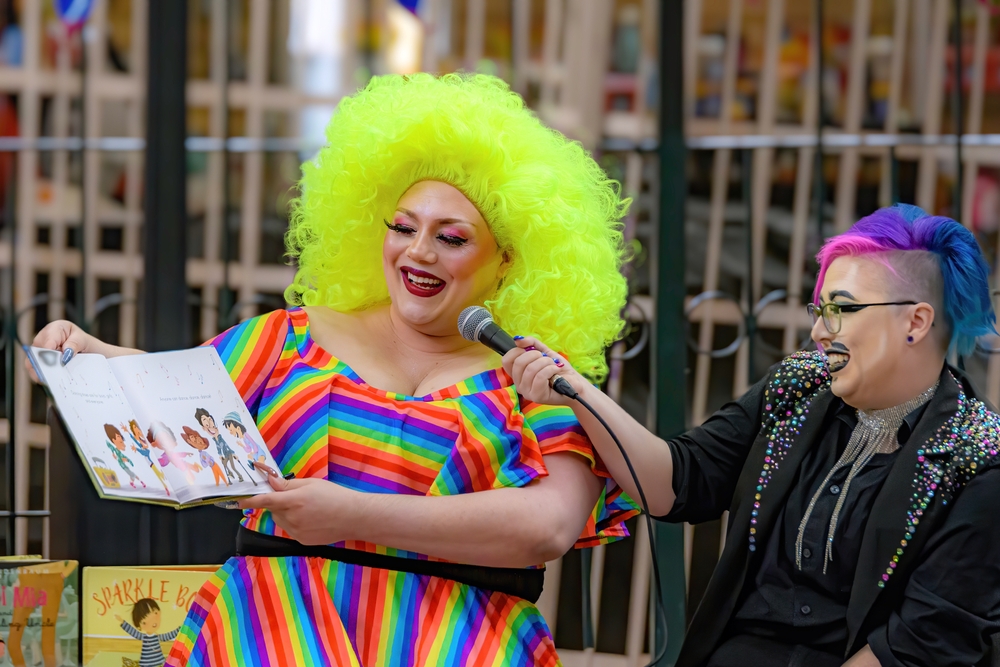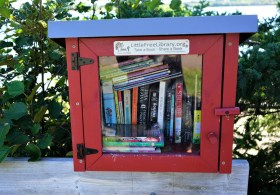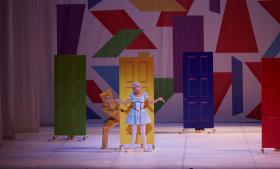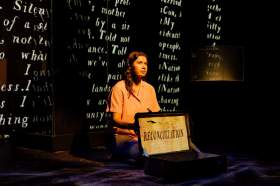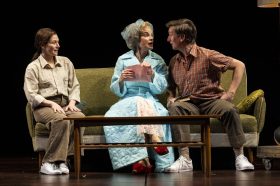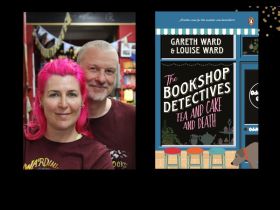Across the world, the LGBTQIA+ community is under renewed attack. In the US, schoolteachers in Florida have been banned from discussing sexual orientation and gender identity in the classroom, after the passing of what was dubbed the ‘don’t say gay’ bill, while Tennessee has banned drag performances (branded as ‘adult cabaret performances’) in public or in the presence of children, while also passing laws that prevent transgender minors from receiving gender-affirming care such as puberty blockers and hormones.
In Europe, Hungary has passed laws banning the promotion of homosexuality in schools; Ireland has seen bookshops picketed by those opposed to drag queen story time events; and, in the UK, anti-trans rhetoric is rife throughout the media.
Anti-trans campaigns are also being waged across the US, and disinformation on the subject is quickly spreading.
As detailed by ArtsHub last week, such toxic debates are also manifesting in Australia, with drag queens – in particular, drag queen story time events – and transgender people drawing the ire of a loose coalition of far right, religious right, conspiracy groups and others.
Read: Queer community the latest target of culture wars
Drag as an art form has a long and proud history – so why is it under such concerted attack today?
Simon Hunt (also known as Pauline Pantsdown) is an artist and queer activist who has utilised music, performance and video across a range of creative projects, often with a political bent. He believes that the moral panic being whipped up around drag story time events ‘is simply a proxy war against transgender people’.
Referencing Judith Butler’s 2021 article, Why is the idea of ‘gender’ provoking backlash the world over?, Hunt notes: ‘The attack on transgender rights is essentially a subset of an attack on women’s rights. So you have these legal organisations in America, the same organisations [that] have just overturned Roe versus Wade, and they’re the ones who are funding the anti-transgender campaign… The same organisations are involved in over 400 anti-transgender bills this year so far, and it’s only May!’
As to why the religious right, far right and their hangers-on have chosen drag queens as a proxy for the transgender community, Hunt says: ‘Drag queens of all genders essentially fit into a history of clowning, in that their speech, appearance and behaviour involves exaggeration of all features, whether gender-based or otherwise.
‘Visually, this exaggeration is useful for far right groups constructing memes and campaigns, as they can use it as a visualisation of how they wish to portray transgender people in general, particularly transgender women; i.e. an image of an everyday trans woman going to the shops or doing her laundry doesn’t cut it in relation to the construction of the “mockery of women” that they wish their imagery to portray.
‘While drag queens are not mocking anyone – the artificial construction of all aspects of society is the template of their comedy – the visual of enhanced makeup, clothing etc matches the image that the far right wish to attach to all trans women,’ Hunt tells ArtsHub.
Engaging with local councils
Last week, various right wing groups turned up at a meeting of the Monash City Council to demand the cancellation of a drag queen story time event at Oakleigh Library on 19 May.
Initially, Monash City Council refused to back down, but after members of the far right – including members of neo-Nazi group the National Socialist Network (who were recently seen supporting an anti-trans rally on the steps of the Victorian Parliament) – threatened to ‘bring as many Nazis as possible‘ to the drag event, coupled with violent threats directed at council staff, the event was cancelled today (Thursday 4 May).
‘Councillors and staff have received messages that nobody should be expected to receive in their workplace, as have our LGBTIQA+ community. In recent days, these threats have escalated to direct threats of violence involving the event itself,’ Monash Chief Executive Dr Andi Diamond told The Age.
A community counter-protest in support of the event was also being planned.
When councils cave in to pressure from the far right and cancel drag queen story time events, neo-Nazis and their fellow travellers invariably interpret the result as a victory for them and their odious beliefs.
So how can we better support drag events, and encourage local councils to stand up to pressure from the far right?
Rallying community support for such events and demonstrating that neo-Nazis and their running dogs are a tiny, shrill minority is a key strategy according to experienced anti-fascist activist Tom Tanuki.
‘Bureaucratic organisations need to familiarise themselves with what community support and solidarity looks like,’ Tanuki tells ArtsHub.
‘The organisers of these events are often bureaucratic or governmental organisations; for example, a local council hosting an event at a library, or venue organisers in a cohort with the council, all being advised invariably by Vic Pol [Victorian Police] to cancel an event because [the police] don’t want to have to shelter it from far right forces.
‘So we’re having to mollify those organisations and encourage attendance from the public to protect events … and, at the same time, we want the far right to know that we’ll be there, and that we won’t give them an easy rollover. We won’t fold,’ he says.
A recent community rally in Newcastle, NSW in support of a drag queen story time event is just one of many examples of how successful this strategy can be.
Read: Maximising your relationship with Council
Ensuring that displays of community support at drag story time events are positive, supportive and colourful sends a strong message to those who are attending.
‘If we scare away families wanting to attend an event that ultimately defeats the entire purpose,’ Tanuki says.
‘So we bill an event as family-friendly community protection, community solidarity, community support. We tell everyone to bring their rainbow flags, come along, stand in solidarity, be a welcoming parade.
‘The biggest thing to me is that you get lots of numbers because, frankly, I don’t care if 20 “sieg heil-ing” neo-Nazis come along and get breathless coverage by the mainstream media the next day about how terrifying they are and how many new laws should be introduced to deal them. I don’t care if there are 100 raging anti-lockdown cookers coming along to try and intimidate events.
‘If 400 to 500 people are standing there with rainbow flags, smiles on their faces, all ready to go, and that happens every time, then this will die out with a whimper and not with a bang – because the events will be protected,’ Tanuki continues.
The more such successful community actions occur in conjunction with drag story time events, the less anxious local councils will be, Tanuki believes.
‘We just need numbers and we just need the right attitude. And as long as we have that consistency of approach, I think we’re going to be able to demonstrate to councils – through repeat successes – that there’s nothing to worry about,’ he says.
‘No one got hurt. No trouble. The more we can have that happen, I think the fewer councils will cancel over time despite their fixation on indemnity and the like. And I think that the events will get safer and safer.’
Reframing the narrative
Simon Hunt notes that another valuable strategy would be to shift the narrative around drag story time events by explaining why they’re needed and who their core audience is.
‘While anyone can bring their kids along to a drag queen story time – and you get some parents who are just like, “Oh, you know, I want to show my kids some diversity, and get some laughs and learn about other people in the world,” and all that – a lot of the people who attend these events are families where the kids themselves are gender divergent, or the parents are, or the parents are gay, or the children are gay,’ he explains.
‘It needs to be made clear that the existence of drag queen story time is on one level about those children and families not feeling safe in other spaces, and so it’s a necessary thing in a world where either the families, or the children, or their relationship to each other or their actual existence as a family, is seen as wrong or under threat. But the fact is these are people who exist and should have as many rights to exist as all other families. And so there needs to be a little bit more awareness of that.’
While some people will accept that rainbow families need specific events catering for them and their needs, they may still ask the question: why should drag queens host such events? Isn’t drag a form of adult entertainment?
In response, Hunt says: ‘Obviously you have a mixture of gay and trans parents and children attending [such events], and the drag queens are performers who are very aware of the slippage of gender and sexuality, and the fact that there are performative aspects involved in everyday life as to the way you present yourself to the world.
‘Plus, they’re trained entertainers and their art is based on comedy, and so they’re absolutely the perfect people to introduce such topics to children. Like, five-year-olds are not going to be entertained by a talk from a university lecturer about gender, you know?’
Expanding existing laws?
Often, moral crusades about drag and gender are driven by claims that right wing protestors are “protecting children’s innocence”. However, as Sarah Austin and Jonathan Graffam O’Meara recently noted in The Conversation, ‘Calls to “protect the children” from drag performers and trans people assume children are, in fact, in need of safeguarding.’
That said, Hunt would like to see existing laws used to keep protesters away from abortion clinics expanded to keep protesters away from libraries and other events hosting children.
‘Each state has existing safe zones legislation, which was about the protection of women attending abortion clinics. And that legislation, I think, is very easily adaptable to be able to ban audio and visual protests at children’s and family events in general,’ he explains.
‘To give a broad example of that, I don’t think that Sunday schools and church youth events are safe places for young people to be. That’s my personal opinion, and I can talk about that online – but I do not think I should have the right to go and protest outside this venue in the presence of children whose parents want them to attend.
‘It’s just like a basic child safety thing where children should not be subjected to Nazis when their parents are taking them to a children’s event.
‘I’d like to see that happen nationally, because we’re not going to see this [moral panic] slow down anytime soon. It’s going to take several years to undo the disinformation and conspiracies that are going around at the moment,’ Hunt says.
The end game is all of us
Both Tanuki and Hunt are adamant that the current coalition of conspiracy theorists, the religious right, so-called ‘gender critical’ activists and the far right – all of whom are currently focused on the same targets: trans and gender diverse members of the LGBTIQA+ community – will not stop their attacks should they somehow manage to disrupt every drag story time event in the country.
Hunt has a special message for those members of the queer community who have allied themselves with the ‘gender critical’ movement and related causes.
‘Those bills in Florida and all those states within the US are not just about trans people,’ he stresses.
‘Yes, they start out with trans people. But then it’s about how women should dress. It’s about virginity. It’s about abortion. It’s about gay and lesbian people in general. It’s everything all together as a bunch and you don’t get to say, “I agree with this part of it and I reject the rest.” You don’t have the power to do that as individuals. You need to look at the intentions and the forces that are being stacked directly against you,’ he says.
Tanunki agrees, saying: ‘This is ground we cannot cede to people who are essentially playing a culture war that doesn’t just end at drag story time. It ends in the erosion of rights for trans and queer people. That’s the point of the agenda. That’s the shifting of the Overton window that they’re attempting here.
‘It’s not about these simple events for children. It’s about using the moralising surrounding a bogeyman narrative involving children to erode rights for queer people. That’s why we can’t cede this ground to them.
‘But it doesn’t have to be a fight. It can just simply be a big solidarity community event, doing that repeatedly, chalking the wins up on the board and watching the far right slowly lose interest. That’s what we can hope for here,’ he concludes.
This is the second article in a series examining the impact of the current culture wars on the LGBTIQA+ community. Read part one here, and part three here.
